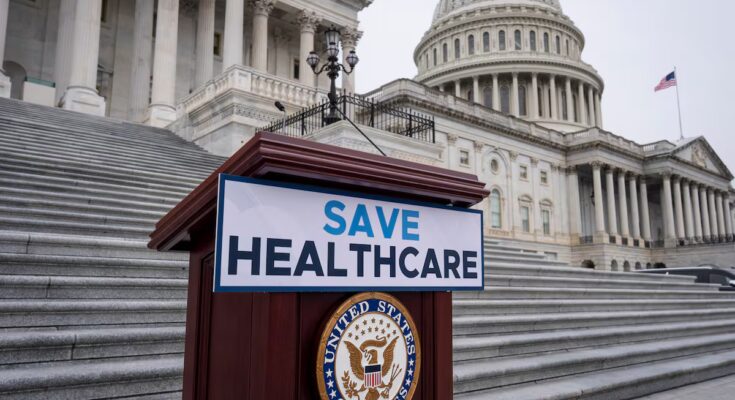For nearly 40 days, Democrats have been locked in a stalemate with the Trump administration, refusing to give in to the president’s pressure to reopen the federal government. The consequences of the longest lockdown in U.S. history were significant: mass layoffs of federal workers, chaos at the nation’s major airports, and the disruption of the food stamp program, on which one in eight Americans depends. Democrats stood firm because access to health care for millions of people was at stake. These millions can afford insurance thanks to federal subsidies that expire at the end of the year and whose renewal keeps the two parties at odds for more than a month. Now, with the looming deal to end the government shutdown, access to affordable healthcare is once again in jeopardy.
Last Sunday, seven Democratic senators changed their position and, together with an independent senator, facilitated the agreement that will be voted on this week in Congress and which will then go to Trump’s desk to end the partial government shutdown. In addition to independent Senators Angus King (Maine), Senators Tim Kaine (Virginia), Dick Durbin (Illinois), John Fetterman (Pennsylvania), Jeanne Shaheen (New Hampshire), Catherine Cortez Masto (Nevada), and Jacky Rosen (Nevada) conceded on a condition that their party considered non-negotiable. In exchange for their support, Republicans pledge to vote on subsidies only in December; a vague promise that doesn’t convince.
“The shutdown may be ending, but the fight to contain health care costs must continue,” Anthony Wright, executive director of Families USA, a health care rights organization, said Monday. “More than 22 million Americans who purchase their own health coverage are now at risk of facing skyrocketing premiums or losing coverage altogether. We are deeply disappointed that this deal includes only the promise of a future vote on extending the enhanced premium tax credits that millions of Americans depend on to afford their coverage.”
The federal subsidies that expire at the end of the year are part of the Affordable Care Act (ACA), known as Obamacare because it was passed during the Barack Obama administration, which designed the law so that millions of people without health coverage could access it through a marketplace offering lower prices. The tax credits they receive for purchasing insurance were approved during the Covid pandemic and will likely disappear from January, as the government did not have to make any concessions on this issue to secure the support needed to pass the budget.
In a country where medical care prices are so exorbitant that health care is a luxury, about 24 million people are insured through Obamacare, a number that has doubled since subsidies were increased in 2021.
These tax credits benefit low- and moderate-income individuals who do not receive health insurance through an employer or other government program. Restaurateurs and retailers, small business owners and employees, barbers, hairdressers, Uber drivers, ranchers, farmers, musicians and artists, real estate agents, dentists… These are workers whose income is not low enough to qualify for Medicaid, the program reserved for the poorest, but who cannot afford insurance and therefore rely on these subsidies, which ensure that their premiums do not exceed 8% of their earnings.
Without this assistance, that percentage could skyrocket to 25% of their salaries. For example, for someone paying $400 a month, the premium could increase to $1,400 a month. Experts estimate that about four million people will lose their health insurance because they can’t afford it.
President Trump had already unsuccessfully attempted to repeal the law during his first term. Last weekend, he reiterated his intention to eliminate subsidies, posting on his social media account, Truth, that they were “a boon to health insurance companies and a DISASTER for the American people.”
political fallout
It remains to be seen how the loss of subsidies will affect the 2026 midterm elections. This year, 18.7 million (77%) of the 24.3 million total ACA enrollees live in states where President Trump won the 2024 election.
Public support remains high for extending the ACA tax credits, with three-quarters (74%) of the public in favor of keeping them, according to a recent poll conducted by KFF, an independent health research organization.
According to the same poll, more than half (55%) of those who buy their health insurance, mostly through the ACA marketplaces, say Democrats should reject a budget that doesn’t include an extension of subsidies. As next year’s midterm elections approach, polling suggests voters favor the Democratic Party on issues related to health care costs. When asked which party they trust most to handle the future of the ACA, a larger percentage of voters favor the Democratic Party (43%) than the Republican Party (32%).
Sign up to our weekly newsletter to get more English-language news coverage from EL PAÍS USA Edition



